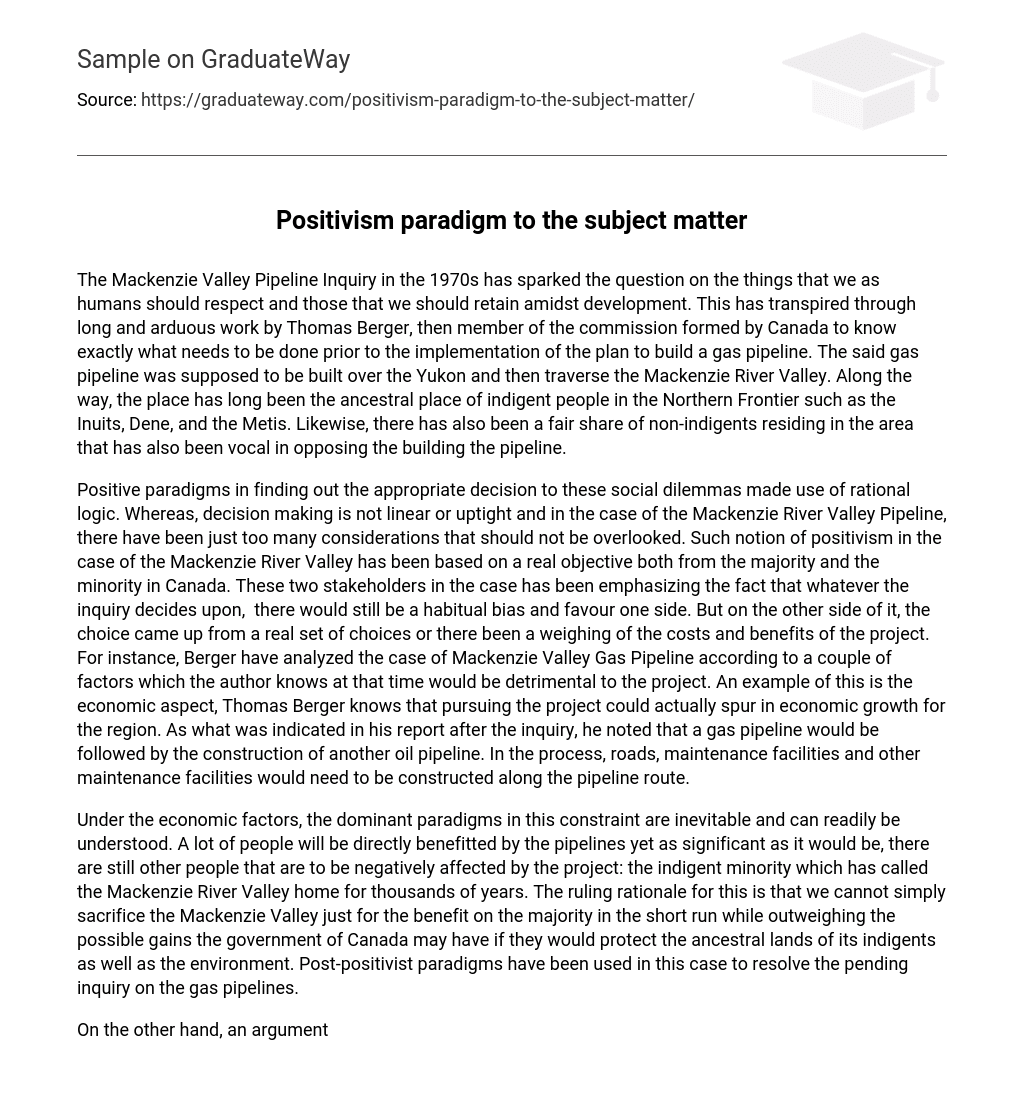The Mackenzie Valley Pipeline Inquiry in the 1970s has sparked the question on the things that we as humans should respect and those that we should retain amidst development. This has transpired through long and arduous work by Thomas Berger, then member of the commission formed by Canada to know exactly what needs to be done prior to the implementation of the plan to build a gas pipeline. The said gas pipeline was supposed to be built over the Yukon and then traverse the Mackenzie River Valley. Along the way, the place has long been the ancestral place of indigent people in the Northern Frontier such as the Inuits, Dene, and the Metis. Likewise, there has also been a fair share of non-indigents residing in the area that has also been vocal in opposing the building the pipeline.
Positive paradigms in finding out the appropriate decision to these social dilemmas made use of rational logic. Whereas, decision making is not linear or uptight and in the case of the Mackenzie River Valley Pipeline, there have been just too many considerations that should not be overlooked. Such notion of positivism in the case of the Mackenzie River Valley has been based on a real objective both from the majority and the minority in Canada. These two stakeholders in the case has been emphasizing the fact that whatever the inquiry decides upon, there would still be a habitual bias and favour one side. But on the other side of it, the choice came up from a real set of choices or there been a weighing of the costs and benefits of the project. For instance, Berger have analyzed the case of Mackenzie Valley Gas Pipeline according to a couple of factors which the author knows at that time would be detrimental to the project. An example of this is the economic aspect, Thomas Berger knows that pursuing the project could actually spur in economic growth for the region. As what was indicated in his report after the inquiry, he noted that a gas pipeline would be followed by the construction of another oil pipeline. In the process, roads, maintenance facilities and other maintenance facilities would need to be constructed along the pipeline route.
Under the economic factors, the dominant paradigms in this constraint are inevitable and can readily be understood. A lot of people will be directly benefitted by the pipelines yet as significant as it would be, there are still other people that are to be negatively affected by the project: the indigent minority which has called the Mackenzie River Valley home for thousands of years. The ruling rationale for this is that we cannot simply sacrifice the Mackenzie Valley just for the benefit on the majority in the short run while outweighing the possible gains the government of Canada may have if they would protect the ancestral lands of its indigents as well as the environment. Post-positivist paradigms have been used in this case to resolve the pending inquiry on the gas pipelines.
On the other hand, an argument about the case of the Mackenzie River Valley Inquiry using the post-positivism paradigm is that some authors say that positivist paradigms are internally inconsistent with reality. This is given by the clash between the Humeian ontology as well as the Cartesian epistemology in the positivist paradigm. Although, modern positivist paradigms as applied to the Mckenzie Valley are of three things: empirical-statistical constraints as represented by the possible losses in the natural environment as well as the possible national revenues which could be generated out of the project. Factual emphasis whereas the common facts like the composition of the inhabitants there has been considered. Lastly, the common sense or sources of the mind whereas it would decide as to what to do with a dilemma. In the case of the Mackenzie Valley Pipeline Inquiry, simple logic won. There are people there, take the pipes somewhere else.
References:
Berger, Thomas. (1972). “Northern Frontier, Northern Homeland”. British Columbria University Press.





